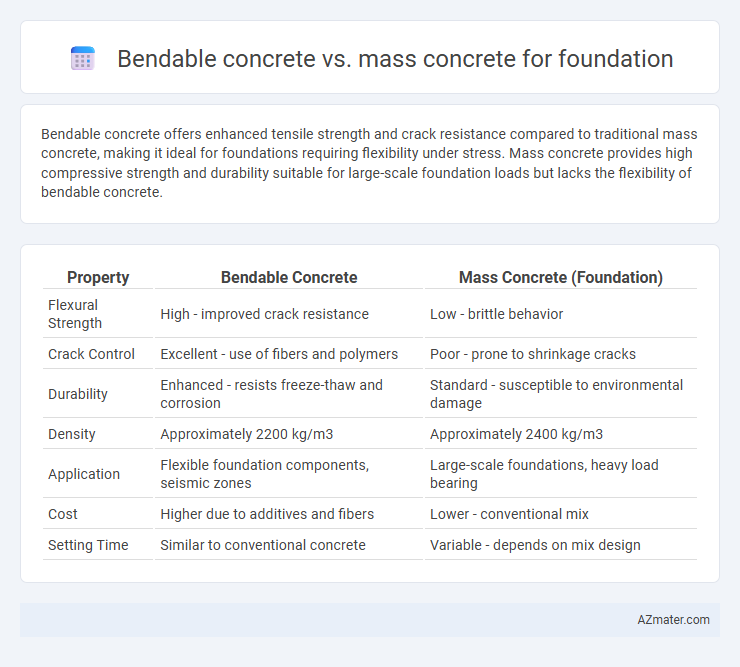Bendable concrete offers enhanced tensile strength and crack resistance compared to traditional mass concrete, making it ideal for foundations requiring flexibility under stress. Mass concrete provides high compressive strength and durability suitable for large-scale foundation loads but lacks the flexibility of bendable concrete.
Table of Comparison
| Property | Bendable Concrete | Mass Concrete (Foundation) |
|---|---|---|
| Flexural Strength | High - improved crack resistance | Low - brittle behavior |
| Crack Control | Excellent - use of fibers and polymers | Poor - prone to shrinkage cracks |
| Durability | Enhanced - resists freeze-thaw and corrosion | Standard - susceptible to environmental damage |
| Density | Approximately 2200 kg/m3 | Approximately 2400 kg/m3 |
| Application | Flexible foundation components, seismic zones | Large-scale foundations, heavy load bearing |
| Cost | Higher due to additives and fibers | Lower - conventional mix |
| Setting Time | Similar to conventional concrete | Variable - depends on mix design |
Introduction to Concrete Types for Foundations
Bendable concrete, also known as ductile concrete, offers improved flexibility and crack resistance compared to traditional mass concrete, making it ideal for foundations subjected to dynamic loads or seismic activity. Mass concrete, characterized by its large volume and low water-cement ratio, provides excellent compressive strength and durability for heavy load-bearing foundations. Understanding the distinct properties of these concrete types helps engineers select the appropriate material based on soil conditions, load requirements, and environmental factors.
Defining Bendable Concrete
Bendable concrete, also known as engineered cementitious composite (ECC), is a high-performance material characterized by its exceptional tensile strain capacity and crack control, making it ideal for foundations requiring enhanced durability and flexibility. Unlike mass concrete, which relies on its bulk and compressive strength to support loads, bendable concrete incorporates fibers and engineered matrix designs to resist cracking and deformation effectively under stress. This advanced material reduces maintenance costs and improves the longevity of foundation structures exposed to dynamic loads or environmental stressors.
Understanding Mass Concrete
Mass concrete refers to large volumes of concrete placed in a single operation, often exceeding dimensions where temperature control is critical to prevent thermal cracking. Its thermal properties and heat of hydration require careful mix design and curing practices to maintain structural integrity in foundation applications. Compared to bendable concrete, mass concrete prioritizes strength and durability for foundational support rather than flexibility or crack resistance.
Mechanical Properties Comparison
Bendable concrete exhibits significantly higher tensile strength and strain capacity compared to mass concrete, making it more resistant to cracking under bending and tension stresses. Its improved ductility and toughness result from engineered fibers or polymer additives, which enhance energy absorption and flexural performance, whereas mass concrete primarily relies on compressive strength for load-bearing. While mass concrete shows superior compressive strength suitable for heavy load foundations, bendable concrete offers enhanced durability and serviceability in dynamic or seismic conditions due to its balanced mechanical properties.
Flexibility and Crack Resistance
Bendable concrete offers superior flexibility and enhanced crack resistance compared to traditional mass concrete, making it ideal for foundations subject to dynamic loads or ground movements. Its engineered microstructure allows it to absorb tensile stresses and deform without fracturing, reducing the risk of structural damage over time. Mass concrete, while strong in compression, is more prone to cracking under stress due to its rigidity and lower tensile capacity.
Load-Bearing Capacities
Bendable concrete exhibits enhanced tensile strength and flexibility compared to traditional mass concrete, allowing it to withstand dynamic and uneven loads more effectively. Mass concrete relies primarily on compressive strength, making it suitable for supporting heavy, static loads but less capable of accommodating structural movement or tension. For foundations requiring superior load-bearing capacity under variable stresses, bendable concrete offers improved durability and resistance to cracking.
Durability and Longevity
Bendable concrete exhibits superior durability compared to mass concrete due to its enhanced crack resistance and flexibility, which significantly reduces structural damage under stress and environmental changes. Mass concrete, while robust under compressive loads, is prone to tensile cracking and shrinkage that can compromise foundation integrity over time. The longevity of bendable concrete foundations is extended by its ability to absorb and distribute stresses, minimizing maintenance needs and ensuring structural performance in dynamic soil conditions.
Installation and Construction Methods
Bendable concrete offers enhanced flexibility during installation, allowing for easier adjustment and reduced cracking risk compared to traditional mass concrete, which requires extensive curing times and careful temperature control to prevent structural issues. Construction methods for bendable concrete incorporate fiber reinforcement and advanced admixtures, facilitating quicker placement and improved durability, whereas mass concrete relies on large volume pours with precise layering to manage heat generation and shrinkage. The adaptability of bendable concrete reduces labor and time costs, making it ideal for foundations subject to dynamic loads, while mass concrete remains suited for heavy-load-bearing structures with stringent durability demands.
Cost Analysis and Economic Impact
Bendable concrete, also known as engineered cementitious composite (ECC), typically incurs higher initial material costs compared to traditional mass concrete due to advanced fiber additives and specialized mixing processes. However, its enhanced durability and crack resistance reduce long-term maintenance expenses and repair frequency, potentially lowering overall lifecycle costs. In large-scale foundation projects, the economic impact of mass concrete remains favorable for upfront budget constraints, while bendable concrete offers cost efficiency through extended structural longevity and decreased downtime expenses.
Applications and Suitability for Foundations
Bendable concrete offers enhanced flexibility and crack resistance, making it ideal for foundations in seismic zones or areas with unstable soil conditions where traditional mass concrete may fail. Mass concrete excels in heavy-load bearing applications like large commercial or infrastructure foundations due to its high compressive strength and durability. Choosing between bendable and mass concrete depends on specific foundation requirements, load conditions, and environmental factors to optimize structural integrity and longevity.

Infographic: Bendable concrete vs Mass concrete for Foundation
 azmater.com
azmater.com